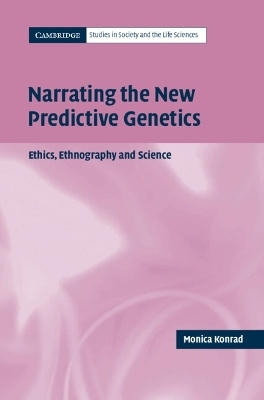
Narrating the New Predictive Genetics
Ethics, Ethnography and Science
Seiten
2005
Cambridge University Press (Verlag)
978-0-521-83314-1 (ISBN)
Cambridge University Press (Verlag)
978-0-521-83314-1 (ISBN)
This book explores how new techniques in genetic testing have changed the relationship between ethics and medicine. Drawing on research with families affected by Huntington's Disease, the author highlights the disparity between actually living with the results of genetic testing and the public debates around genetic testing and medicine.
This book explores the way changes in technology have altered the relationship between ethics and medicine. For some inherited diseases, new genetic testing technologies may provide much more accurate diagnostic and predictive information which raises important questions about consent, confidentiality and use of the information by family members and other third parties. What are the implications of this knowledge for individuals and their families? And for society more widely? How should this new information be used? How do people deal with the choices that new knowledge and technologies offer? Drawing on extensive ethnographic research with families affected by Huntington's Disease, and using perspectives from medical and cultural anthropology, the author explores the huge disparity between the experience of living with the results of genetic testing and the knowledge and expertise which are drawn on to develop policy and clinical services.
This book explores the way changes in technology have altered the relationship between ethics and medicine. For some inherited diseases, new genetic testing technologies may provide much more accurate diagnostic and predictive information which raises important questions about consent, confidentiality and use of the information by family members and other third parties. What are the implications of this knowledge for individuals and their families? And for society more widely? How should this new information be used? How do people deal with the choices that new knowledge and technologies offer? Drawing on extensive ethnographic research with families affected by Huntington's Disease, and using perspectives from medical and cultural anthropology, the author explores the huge disparity between the experience of living with the results of genetic testing and the knowledge and expertise which are drawn on to develop policy and clinical services.
Monica Konrad is Fellow of Girton College and Research Associate at the Department of Social Anthropology, University of Cambridge. Her recent publications address the relevance of contemporary anthropology for global governance in science, international bioethics, and interdisciplinary studies.
Part I. Ethnography as Linkage Map: 1. Thinking futures; 2. Approaching translocations; Part II. 'Home Truths': 3. Foretelling foreknowledge; 4. Tracing genealogies of non-disclosure; Part III. Relational Ethics in Practice: 5. Reproducing exclusion; 6. Relinquishing exclusion; 7. Conclusion; Appendix.
| Erscheint lt. Verlag | 17.2.2005 |
|---|---|
| Reihe/Serie | Cambridge Studies in Society and the Life Sciences |
| Zusatzinfo | 1 Halftones, unspecified |
| Verlagsort | Cambridge |
| Sprache | englisch |
| Maße | 158 x 235 mm |
| Gewicht | 463 g |
| Themenwelt | Medizin / Pharmazie ► Medizinische Fachgebiete ► Medizinethik |
| Studium ► Querschnittsbereiche ► Geschichte / Ethik der Medizin | |
| ISBN-10 | 0-521-83314-0 / 0521833140 |
| ISBN-13 | 978-0-521-83314-1 / 9780521833141 |
| Zustand | Neuware |
| Haben Sie eine Frage zum Produkt? |
Mehr entdecken
aus dem Bereich
aus dem Bereich
Die Geschichte eines Weltzentrums der Medizin von 1710 bis zur …
Buch | Softcover (2021)
Lehmanns Media (Verlag)
17,95 €
Krankheitslehren, Irrwege, Behandlungsformen
Buch | Softcover (2024)
C.H.Beck (Verlag)
39,95 €


